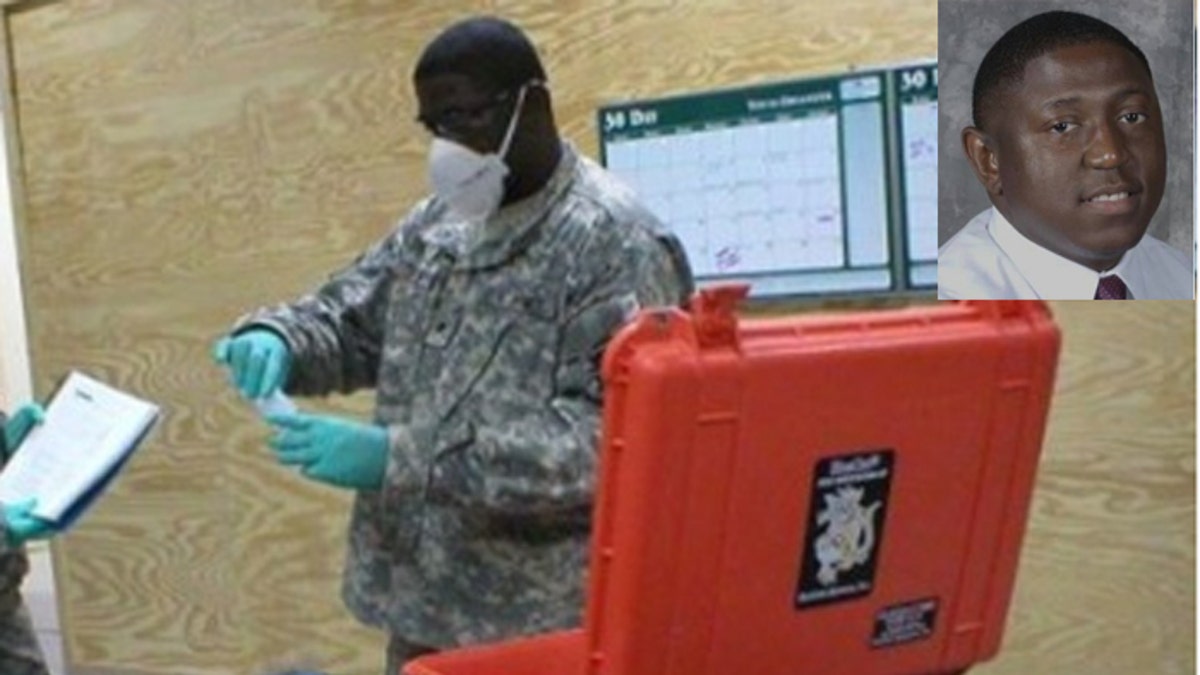
Working the Mississippi soil as a boy with his father prepared Randy Sandifer, shown here, for a special task in service of his country.
The last thing Randy Sandifer imagined when he was working in the yard alongside his father was that one day he would find himself halfway around the world - in the midst of a war - and later nominated for a Noble Peace Prize.
Sandifer’s story begins with his hands digging deep into the soil in rural Mississippi.
"My father had a garden, and he made me work in it. I hated it," he said. "But the sweat, the time, the energy it takes to run a garden, those are the valuable life lessons I learned from my father."
Sandifer’s hate for the garden eventually transformed into a love and passion for the environment.
Sandifer joined the Army Reserves in December 2001 and deployed to Iraq after his sophomore year at the University of Mississippi. He was sent as an administrative clerk with the 412th Theater Engineer Command, but he volunteered to work with the soil lab and the environmental team, cleaning up pollutants left by U.S. forces. It was his work testing hydrocarbon levels near the local water supply at Iraq's notorious Abu Ghraib prison that got him nominated for the Nobel Peace Prize. Sandifer points out in addition to mistreatment of people, the environment also suffered.
"There were also environmental atrocities that took place there, but many people do not know about the environmental crimes that were taking place," said Sandier. He explains the blame should not only fall on the United States, but also everyone who stayed at the prison. "One of the biggest ones is soil contamination because it has a direct affect with the water supply and runoff there in Iraq…when it rains, it enters the water supply.
"There are very important rivers in Iraq that the local people live off of and use to put on their crops," he added.
Sandifier also believes his discovery is important because it has encouraged the U.S. Army to implement new ways to make sure environmental regulations are being adhered to, like putting drip pans under equipment that uses gasoline. But he said the closure of the prison was the biggest deal, even for his fellow soldiers.
"When you do environmental testing and it closes down Abu Ghraib prison, that's huge. Soldiers were happy to get out of there because the living conditions there were not as good as others in Iraq…they had to wear their protective vest and helmet 24/7, even going to the restroom…the closure had a direct effect on soldiers morale, too,” said Sandifer.
Sandifer was nominated for the Nobel Peace Prize by Arkansas' Philander Smith College Professor Jonathan Hutchins. Hutchins listened to a speech given by Sandifer in 2006 at the Little Rock college about his environmental forensic work in Iraq and nominated Sandifer in 2014.
University professors are one of seven categories of people allowed to nominate candidates for the prize. Hutchins found Sandifer's work important because his research contributed to help global warming issues and he was impressed by the self-taught man.
"Mr. Sandifer solely taught himself the necessary skills to take on the large undertaking of environmental assessment, testing, and cleanup of Abu Ghraib and other locations around Iraq…Hydrocarbons in relation to the environment are largely responsible for global warming…Although these environmental atrocities took place in Iraq, the affects would have been felt globally if it wasn't for the countless hours spent tracing and quantifying hydrocarbons in the soil spilled purposely by military personnel," Hutchins wrote in his nomination letter.
Randy's stepmother, Estella Sandifer, believes the Lord played a major role in her son's life. "I'm Godly proud of Randy…we kept him in church, the learning of the Bible and trust in God," said Sandifer.
Randy's brother Jason Sandifer said it wasn't always easy growing up.
"When you grow up, and your father is very hard on you, and tells you that you came from nothing, and telling you to do this and that -- save your money, to work hard…that taught us a lot," said Sandifer.
Sandifer lost his birth-mother at an early age. His father, Willie Roy Sandifer who passed in 2010, helped sow the seeds for success teaching the art of gardening and the values of hard work, patience, and perseverance.
"My father had a nurturing spirit, and that rubbed off on me," said Sandier. Sandifer is now 30 years old, a former ballistics expert at the Army Crime Lab in Atlanta, and currently owns his own forensics firm called Sandifer & Associates.
The Nobel Peace Prize is an international award given each year since 1901 by the Norwegian Nobel Committee. Pakistan's Malala Yousafzai and India's Kailash Satyarthi won the award this year for their efforts against the oppression of children. The Nobel committee received 278 nominations for the 2014 prize, according to its website — the most in the award’s history, beating the 259 sent in last year. Sandifer will not know for a while if he was even considered this year, the Committee does not release the nominees list until 50 years later.
But the story may not end here, Sandifer’s nomination is being rolled over into next year's list of nominees so maybe then he will find out if the seeds he planted as a child will grow into a Nobel Peace Prize.
The Army Times and The Clarion-Ledger contributed to this story.

